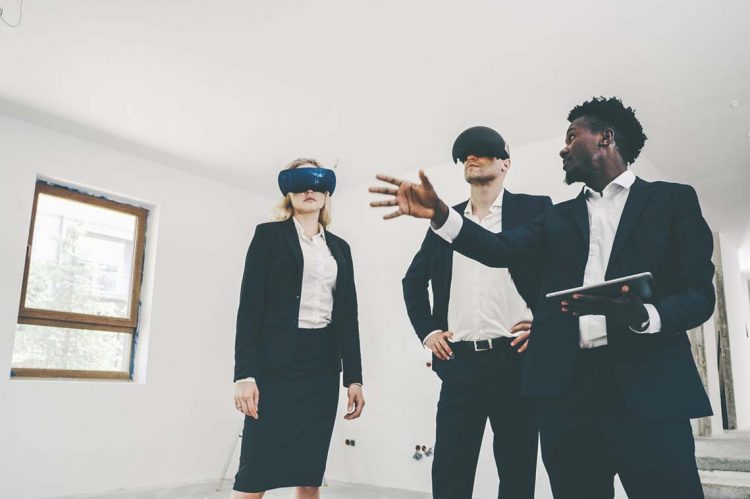Strolling through what is starting to feel more and more like your dream house, you notice what appears to be cracks in the living room paint. Rather than make a note on your phone or start drafting an email, you simply reach out and tap the wall. A text box appears out of thin air, informing you that the paint job is seven years old, likely using a generic brand-matte. With another tap, the walls and ceiling transform, shining with a fresh coat of triple-layer seafoam blue. You turn to your real estate agent.
“Can you get me a quote on a new living room paint job?”
“Oh, you bet, I know a guy.”
You are not, of course, in the house, and neither is your agent. The walls, ceilings, appliances, furniture, stairways, chandeliers and windows you observe are all part of a model rendered from photos taken with a cell phone and automatically formed into an accessible, interactive virtual space that allows you to experience the minutiae of a house without ever leaving yours.
This whole scenario takes place in the future—not a Star Trek-like distant future but rather a rapidly approaching new era for real estate, according to Jon Coile, vice president of MLS and industry relations at HomeServices of America.
“It’s not there yet,” he says. “All of that stuff is coming—none of it is here yet, but it’s coming.”
The companies that hold the data, and have access to the skills to implement this new world are still somewhat a relic of their divided past. Real estate MLSs, though, are where the first steps toward this revolutionary way to present and show homes are already being taken, a future industry insiders and leaders say is inevitable—though the specific priorities, challenges and applications of the tech remain up for debate.
Another concept that thought leaders agree on is that some of the tech that will serve as the foundation for this brave new world is just being built right now in the present, and anyone in the industry not open to it will quickly start becoming irrelevant.
“People are collaborating, they are open to technology, they are using data as a tool instead of a weapon,” says Bill Fowler, who currently works as consultant after senior roles in tech and leadership at both Compass and Zillow. “So there are those—among the top 50 MLSs, I guess you could probably say 50% of those are looking in that direction. And then you have everyone else.”
The challenge, according to Fowler, is not building a quantum computer that can host a real estate metaverse or convincing consumers to move into these new spaces. Instead, it is the mindset and fears of an industry old guard that, to the detriment of both practitioners and consumers, is failing to foster tech innovation.
“The industry as a whole thinks in really specific, very high-walled silos,” Fowler laments.
Though he offers some optimism based on recent, forward-thinking leadership moves and efforts to collaborate and cooperate in the MLS sector, Fowler is a self-described cynic when speaking about the overall state of tech and MLSs.
But regardless of when or how it comes to be, the specific opportunities offered by visual, interactive technology for real estate are incredibly exciting.
A Final Frontier
Coile reaches beyond the world of real estate to describe the incredible power that high-tech visual experiences can impart on a consumer. The Van Gogh Immersive Experience, a traveling exhibit based on the works of the eponymous painter, uses 360-degree projectors and VR to turn still paintings into an alluring, encompassing space that moves and lives.
“It’s an incredible way to present art, never seen anything like it,” Coile says, excited. “But let’s talk about real estate.”
Using almost the same technology, Coile describes a scenario where a real estate office could incorporate a room where someone can experience a house or street in this way—moving, active, detailed and potentially interactive. It would be possible to walk through a dozen houses or neighborhoods, watching cars drive by, listening to the hum of a refrigerator, from the comfort of a single room.
“We have a little tiny bit of that,” he says. “But imagine it’s a total immersive experience—it would change the way we sell real estate.”
Sellers would be able to create a full virtual, refined and curated experience of their home—not just a video tour, but the opportunity for potential buyers to walk, crawl, or even fly through and around the property, with desirable aspects or amenities highlighted. Buyers would be able to get a much more realistic and comprehensive first look at a home with minimal effort.
There are tech challenges, of course, besides getting 600 different companies to collaborate and invest in these things, though the gap between today’s tech and this type of scenario is closing more and more rapidly.
Mike Wurzer is president and CEO of FBS, an MLS and tech company based out of North Dakota. FBS recently launched a system called FloPlan, which can automatically incorporate detailed floor layouts into MLS listings using just a cell phone. Though this might seem like it is a long way from what Coile describes, from the back-end perspective it is an absolutely vital building block for three important requirements of this future tech: intuitiveness, automation and scalability.
“The capability of the devices to collect that data is just accelerating so rapidly,” Wurzer says. “I would say that is kind of one of the bigger obstacles to broad consumer adoption…it has to get easier, less proprietary.”
It doesn’t matter how spectacular an experience is if you can’t make it accurate and accessible using ubiquitous tools like a smartphone, Wurzer says. Phones are already beginning to have some of these capabilities—at relatively low quality, he admits, but within a couple years, will possibly be able to support the kind of high-detail capture needed to create refined 3-D spaces.
This is still only once piece to the tech side of a metaverse-like space. Machine learning that can identify things like the type of countertop or brands and ages of appliances and automatically apply or display it is also advancing, but also not quite there yet, according to Wurzer.
But there are already start-ups and engineers pounding out solutions, and the acceleration toward some form of the metaverse—not necessarily the same concept as Facebook founder Mark Zuckerberg has outlined, but something designed for real estate—is just over the horizon.
Fowler says a “Mark Zuckerberg of real estate”—meaning a person with the ideas and the vision to catalyze a major jump forward in these areas—is already out there, working on their big idea. The problem right now is no one is returning that person’s calls.
“We as a community…are all going to have to see that we are all on the same team,” he expounds. “See the benefit of data access for those who are going to create these environments, that that benefit is ultimately the consumer benefit—and ultimately, the consumer is all of our customer.”
MLSs that are open to these start-ups and idea-bringers, who “roll out the red carpet” when appropriate are already seeing the benefits, according to Fowler. The largest MLS in the country, CRMLS in California, last year launched a $15 million venture capital fund, and other smaller MLSs have banded together to purchase tech or tech companies that are working on these sorts of projects.
“It’s a very exciting time in this space, to be sure,” Wurzer says.
Building Bridges
One argument floated by those less enthused about the idea of MLS metaverses is that consumers simply aren’t that interested—that they are happy with photographs and data fields they can scroll on their phones and computer screens.
Wurzer offers some sympathy for this perspective, even as he pushes forward with the future tech himself, saying that the first step for anyone interested in either buying or selling a home continues to be gathering that basic data with ordinary photographs.
“The 2-D world just dominates the stage still, it’s convenient, easy, nobody has a learning curve,” he says. “If somebody is going to take the time to drag furniture around in a virtual space—the demand isn’t quite there yet. Some people right now , but they’re the exception rather than the rule.”
But using this alleged lack of consumer demand to justify ignoring the possibilities of virtual, visual MLS technologies is deeply misguided, according to Fowler.
“It drives me insane,” he says. “That drives me absolutely bonkers. Yes, of course consumers want that, some level of consumer wants any possible thing you can dream up.”
He describes one of his own recent experiences looking for a condo, where he wasted significant time and energy driving to see a property that did not have the kind of yard space he needed—something even the most basic virtual visit or tour would have revealed in seconds. Both consumers and real estate professionals understand the inconvenience of losing time over something like this, Fowler claims.
Another worry is privacy, and the question of who owns the virtual spaces or the virtual properties that live in them. Wurzer says that is an incredibly nuanced question involving legal issues and practical pitfalls that will require cooperation across the industry in order to advance.
In some ways, the fears around a centralized real-estate metaverse are well-founded, both Wurzer and Fowler agree.
“You’re looking at it through a lens of social media, that’s really the only thing we have to draw upon as an analog,” Fowler says. “Social media has been the worst experiment in personal privacy, it’s just like a murder scene for privacy, and everyone is naturally afraid of that.”
Seeing that as a delicate challenge instead of an insurmountable barrier has been hard for many, according to Fowler, even though MLSs have negotiated these things before.
“Those questions arise with photographs, and that’s where MLSs need to play a role,” Wurzer adds. “That’s really been an expertise that they have, to try to help solve that over time, and it will triply apply as 3-D becomes more common.”
Some go further and worry that broad data access will make the role of a real estate agent irrelevant. Coile says that these people are seeing the role of an agent or broker far too narrowly.
“It doesn’t take away the need for real estate agents,” he says. “We’re the ones who are out there with our sellers figuring out how to create our presentation to fit into this ‘metaverse,’ and then our main role is negotiations and guiding them through the emotional process, buying and selling.”
Fowler adds that many of these same objections came up in response to the advent of the internet, and the rise of Zillow.
“If a website is going to replace you, you need to get out of the business anyway,” he says. “If giving the consumer all the data is going to put you out of business, then you have a problem with your business model.”
Furthermore, curating and verifying virtual spaces and information will be incredibly important so consumers can rely on the accuracy of a metaverse-like space—something real estate professionals are already relied on to do.
Coile uses the analogy of ordering furniture online, where companies must build trust so shoppers know that what they see is what they get. Buying on Amazon, which dedicates significant resources to ensuring the quality of products sold on its platform, you nearly always receive what you expected, as opposed to an unregulated platform like Craigslist, where sales are minimally policed and you can never be sure how much an item will vary from the descriptions or photographs on a listing.
“When anybody can put data in, that’s just crap—you can’t rely on it,” he says. “We have agreed that we are only going to put accurate data. If it says that is in Anapolis, it’s not really in the next town over.”
All the challenges, all the history and all the dissenting voices might delay but will not stop the evolution of real estate. Coile says that it is already clear that that evolution is toward something visual, immersive, accessible and collaborative.
“It’s not only within reach, the MLS industry is already marching in that direction,” he promises.
 Jesse Williams is RISMedia’s associate online editor. Email him you real estate news ideas to jwilliams@rismedia.com.
Jesse Williams is RISMedia’s associate online editor. Email him you real estate news ideas to jwilliams@rismedia.com.












